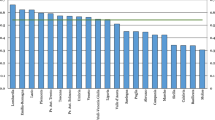Abstract
The aim of the work is to study the convergence of regions in terms of digital development indicators, taking into account spatial location. The following hypothesis is tested in the article: there is a conditional and unconditional β-convergence of the levels for digital infrastructure in the Russian regions. To test for unconditional β-convergence, the empirical model specification proposed by Barro and Sala‐I‐Martin. The most important parameters of the digital infrastructure development, such as the proportion of Internet users, Internet sales, use of electronic public services, taking into account the spatial location of the regions, were chosen as the analyzed indicators. The authors used estimation of β-convergence for the data of the period from 2014 till 2018. Global and local indexes of Moran’s spatial autocorrelation were calculated, spatial scattering diagrams were constructed by the analyzed parameters based on the tools of spatial econometrics. The study used a matrix of inverse distances and a boundary matrix of weights. Regional unconditional β-convergence and positive global spatial autocorrelation in terms of the level of development of the digital infrastructure of the regions of the Russian Federation for all analyzed periods were revealed. Based on the study, it was concluded that, firstly, the distribution of the selected indicators of regional activity is determined by their spatial location, secondly, the rate of convergence of regions is high for all analyzed indicators, except for retail.
Access this chapter
Tax calculation will be finalised at checkout
Purchases are for personal use only
Similar content being viewed by others
References
Graham, S.: The end of geography or the explosion of place? Conceptualizing space, place and information technology. Prog. Hum. Geogr. 22(2), 165–185 (1998)
Greig, J.M.: The end of geography: globalization, communications, and culture in the international system. J. Conflict Resolut. 46(2), 225–243 (2002)
Jansson, A., Falkheimer, J., Livréna, A.B. (eds.): Geographies of Communication. The Spatial Turn in Media Studies, Kungälv, Sweden, 316 p. (2006)
Cruz-Jesus, F., Oliveira, T., Bacao, F.: Digital divide across the European union. Inf. Manag. 49(6), 278–291 (2012). https://doi.org/10.1016/j.im.2012.09.003
Freeman, J., Park, S., Middleton, C., Allen, M.: The importance of broadband for socio-economic development: a perspective from rural Australia. Australas. J. Inf. Syst. 20, 1–18 (2016). https://doi.org/10.3127/ajis.v20i0.1192
Brovkova, A.V.: Factors convergence russian regions and their characteristics in the reproductive cycle of the human potential. Izvestiya of Saratov Univ. New Ser. Ser. Econ. Manag. Law 15(2), 143–150 (2015). https://doi.org/10.18500/1994-2540-2015-15-2-143-150
Balash, O.S.: Spatial analysis of convergence of the regions of Russia. Bull. Saratov Univ. Ser. Econ. Control Right 4, 45–52 (2012)
Kholodilin, K.A., Oshchepkov, A., Siliverstovs, B.: The Russian regional convergence process: where is it leading? East. Eur. Econ. 50(3), 5–26 (2012)
Schmidt Joel, T., Tang, M.: Digitalization in education: challenges, trends and transformative potential. In: Führen und Managen in der digitalen Transformation, pp 287–312 (2020)
Bond, M., Marín, V.I., Dolch, C., Bedenlier, S., Zawacki-Richter, O.: Digital transformation in German higher education: student and teacher perceptions and usage of digital media. Int. J. Educ. Technol. High. Educ. 15(1), 15–48 (2018)
Lee, J., Cameron, I., Hassall, M.: Improving process safety: what roles for Digitalization and Industry 4.0? In: Process Safety and Environmental Protection, vol. 132, pp. 325–339 (2019)
Meyer, U., Schaupp, S., Seibt, D. (eds.): Digitalization in Industry: Between Domination and Emancipation, p. 289. Springer, Cham (2019). https://doi.org/10.1007/978-3-030-28258-5
Acemoglu, D., Restrepo, P.: Robots and jobs: evidence from U.S. labor markets. NBER Working Paper 23285.27 p. (2017)
Agrawal, A., Gans, J.S., Goldfarb, A.: Artificial intelligence: the ambiguous labor market impact of automating prediction. NBER Working Paper 25619, 27 p. (2019)
Frey, C.B., Osborne, M.A.: The future of employment: how susceptible are jobs to computerization? Technol. Forecast. Soc. Chang. 114, 254–280 (2017)
The share of the population using the Internet to order goods and (or services) in the total population. https://www.fedstat.ru/indicator/43565. Accessed 21 Feb 2021
Share of the population who are active users of the Internet. https://www.fedstat.ru/indicator/43566. Accessed 21 Feb 2021
The share of citizens using the mechanism for receiving state and municipal services in electronic form. https://www.fedstat.ru/indicator/43568. Accessed 21 Feb 2021
The share of Internet sales in the total retail trade turnover. https://www.fedstat.ru/indicator/50236. Accessed 21 Feb 2021
Barro, R.J., Sala-I-Martin, X., Blanchard, O.J., Hall, R.E.: Convergence across States and Regions. Brook. Papers Econ. Activ. 1991(1), 107 (1991). https://doi.org/10.2307/2534639
Kolomak, Еvgenia: Interregional disparities in Russia: economic and social aspects. Spat. Econ. 1, 26–35 (2010). https://doi.org/10.14530/se.2010.1.026-035
Ertur, C., LeGallo, J., Baumont, C.: The European regional convergence process, 1980–1995: do spatial regimes and spatial dependence matter? Int. Reg. Sci. Rev. 29(1), 3–34 (2006)
Rey, S.J., Montouri, B.D.: U.S. regional income convergence: a spatial econometric perspective. Reg. Stud. 33(2), 143–156 (1999)
Acknowledgment
The reported study was funded by RFBR according to the research project № 19-010-00562.
Author information
Authors and Affiliations
Editor information
Editors and Affiliations
Rights and permissions
Copyright information
© 2022 The Author(s), under exclusive license to Springer Nature Switzerland AG
About this paper
Cite this paper
Kozonogova, E., Dubrovskaya, J. (2022). Assessing the Convergence of the Digital Infrastructure Development in the RF Regions: Spatial Analysis. In: Antipova, T. (eds) Comprehensible Science. ICCS 2021. Lecture Notes in Networks and Systems, vol 315. Springer, Cham. https://doi.org/10.1007/978-3-030-85799-8_11
Download citation
DOI: https://doi.org/10.1007/978-3-030-85799-8_11
Published:
Publisher Name: Springer, Cham
Print ISBN: 978-3-030-85798-1
Online ISBN: 978-3-030-85799-8
eBook Packages: Intelligent Technologies and RoboticsIntelligent Technologies and Robotics (R0)




